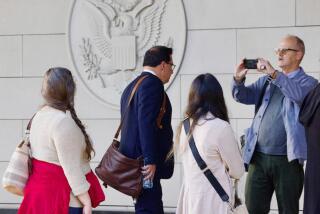A careful traveler becomes a bit warier
I am a seasoned traveler, so I felt safe enough to take a vacation by myself to Spain a couple of years ago.
I had visited the country solo several times and always felt at home. I loved the warmth and energy of the people, the grandiose buildings, the savory dishes and the lively sounds of flamenco. Little did I know that my trip would change the way I travel.
As a New Yorker and regular subway rider, I was vigilant almost from birth, and my peripheral vision was acutely developed. Although I always had been warned to beware of pickpockets on trains, at airports, hotels and restaurants, I never really thought one would target me.
But in Madrid, one did. My identity and money were stolen in a New York minute — and I never felt a thing. There are lessons in my tale for all travelers.
I had just arrived at the airport in Madrid and asked the clerk at the information desk about the best way to travel to the center of the city. The clerk said the Metro was the fastest and least expensive way to go, even though I had to make two changes. I didn’t know I’d be hitting rush hour on a Friday evening.
With Metro map in hand, I held tightly onto my backpack and my one suitcase as I rolled it onto the first train. I had stashed my passport, money and credit cards in my wallet in my fanny pack belted in front of me, and my coat was slightly open.
The subway appeared efficient and clean, though crowded. But because I had just spent the previous week negotiating the subways of Barcelona, I felt confident.
As I got off at my first stop and boarded the second train, I cautiously moved toward the back of the car away from the crowd. I noticed a young, nicely dressed girl to my right. A minute before the doors opened to my final stop, I saw the girl race to the door. As the door opened, I looked down at my fanny pack. It was open — and my wallet was gone.
A lovely Spanish woman and her daughter led me to the Metro police station, where I was handed a brochure with some toll-free numbers to the Visa credit card company and the U.S. Embassy, among others.
The police officers spoke little English, and my limited Spanish was useless. After a while, another officer, whose English was more proficient, arrived. He told me I had to fill out an accident report, but because the station was closing, I should go the next day to Madrid’s main police station, a 10-minute walk from my hotel.
Before I left, I tried to call the American Embassy, but a recorded message told me the office was closed until Monday.
I walked in fear, looking nervously sideways and behind me, to the hotel. I had called the hotel from the police station to notify the personnel of my misfortune. When I arrived, the clerks were sympathetic.
Fortunately, I had a few hundred dollars in traveler’s checks hidden in my suitcase. I was able to cash them at the hotel without any identification because I had paid the bill in advance. I settled into my room and called my credit card company and bank. I spent hours talking to representatives who were confused about their replacement and cash-sending policies, but later I was able to speak with a supervisor — I should have asked for her first — and was told that Visa could overnight a card and cash to me.
I also had had enough foresight to carry copies of my important documents, which made getting a passport, stopping the use of my bank cards and expediting information across borders easier.
The next morning, I navigated my way through serpentine streets, again fearful of my surroundings and the next thief. As I waited for an Englishspeaking officer, I encountered a string of victims with their own stories.
When my turn came, I was led into a small room by two affable individuals in blue suits. They were not officers but members of an organization assisting foreigners who are victims of crime.
In the room, I was given access to a phone to make more calls, if necessary, and then was interviewed by phone by a police officer who took my final report.
The inspectors treated me kindly and gave me a pin with the emblem of Madrid along with tickets for a full-day city sightseeing bus tour. I felt as if I were at a tourist bureau, not a police station.
I also was told to check at the lost-and-found office in a few days to see if my wallet had been returned with any of the credit cards. My chances of retrieving anything, though, were slim.
When Monday came, I arrived at the U.S. Embassy half an hour before it opened because I had been warned of long lines. It was a particularly busy day; more than a dozen Americans were dealing with passport thefts that had occurred on Friday, one of the embassy’s officers said.
As I waited patiently for my temporary passport (which would be good for one year and cost $85), I chatted with other Americans and other travelers and heard their sad sagas. It was like group therapy.
After filling out two documents and taking photos of myself at a photo machine in the embassy, I was given a new passport. I was elated to have my identity back. It meant more to me than money.
Now I am wiser and more aware of my surroundings, even when I am home in San Francisco.
*
(BEGIN TEXT OF INFOBOX)
On becoming a wiser traveler
The theft of my passport and money made me a more wary traveler. Here are some steps to take when traveling:
Never wear a fanny pack or place all your money and credit cards in one place — even if you are in a hurry and traveling only a short distance.
Wear a money belt under your clothing, where it is not visible, especially if you will be going in trains, shopping centers or airports.
Never assume that if a person is dressed well that he or she is less a thief than a poor-looking person.
Consider whether you want to take the subway from the airport if you have luggage. The bags could signal that you are a traveler or foreigner.
Always carry some traveler’s checks as a backup. If lost, they can easily be replaced.
Make three copies of your passport, credit cards, ATM card, driver’s license, medical card and any other important documents that you are carrying and leave one copy of everything at home.
Take the international phone numbers of credit cards, ATM cards, your phone company and the American Embassy in your destination country.
E-mail important telephone numbers to yourself.
Before your trip, check for alerts or information about foreign destination at https://www.travel.state.gov .
Don’t wear expensive jewelry.
Always be aware of your surroundings.
— Beverly Mann
More to Read
Sign up for The Wild
We’ll help you find the best places to hike, bike and run, as well as the perfect silent spots for meditation and yoga.
You may occasionally receive promotional content from the Los Angeles Times.






